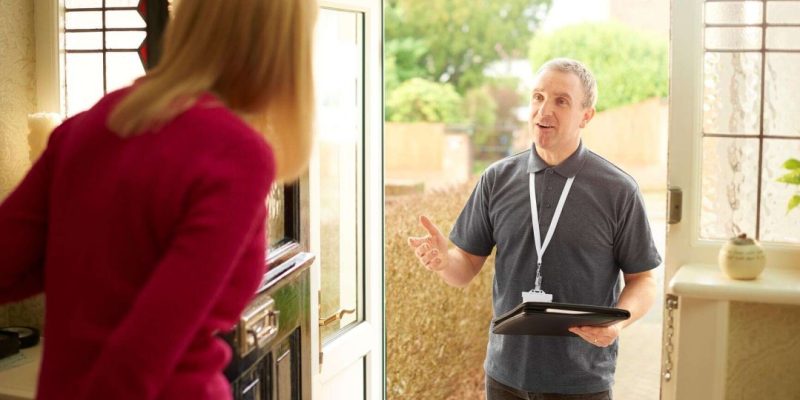Is Door to Door Sales Illegal? What You Need to Know

Door-to-door sales is one of the oldest forms of direct marketing, allowing businesses to connect with customers face-to-face. However, in modern times, many people question whether door-to-door sales are legal due to concerns about privacy, scams, and local regulations.
In this article, we’ll explore the legality of door-to-door sales, the rules that govern them, and how both businesses and homeowners can navigate this sales method confidently and legally.
Is Door to Door Sales Illegal?
In most countries, including the United States and the United Kingdom, door-to-door sales are legal as long as certain rules and regulations are followed. However, restrictions may vary depending on local laws, neighborhoods, and the type of product or service being sold.
When Is Door-to-Door Sales Legal?
Door-to-door sales are legal when:
- Salespeople have the required permits or licenses.
- They respect local “No Soliciting” signs and community rules.
- They adhere to consumer protection laws, such as providing clear pricing and cancellation options.
When Can Door-to-Door Sales Be Illegal?
Door-to-door sales may be considered illegal if:
- Salespeople trespass on private property where solicitation is prohibited.
- Fraudulent or misleading practices are used to sell products.
- The salesperson fails to comply with local ordinances or licensing requirements.
Laws and Regulations Governing Door-to-Door Sales
To protect consumers and ensure ethical practices, governments have established laws regulating door-to-door sales.
Licensing and Permits
- Many municipalities require salespeople to obtain a permit before engaging in door-to-door sales.
- Some areas may require background checks or registration for security purposes.
Consumer Protection Laws
- FTC Cooling-Off Rule (United States): Customers have the right to cancel purchases over $25 made at their home within three business days.
- False Advertising Laws: Salespeople cannot make false claims about their products or services.
Respecting “No Solicitation” Signs
- Salespeople must respect signs that explicitly prohibit solicitation, as ignoring them could lead to trespassing charges.
Neighborhood and HOA Restrictions
- Some neighborhoods or homeowners’ associations (HOAs) prohibit or restrict door-to-door sales within their communities.
Common Concerns About Door-to-Door Sales
Privacy and Security
- Homeowners may feel uncomfortable with uninvited sales people knocking on their doors.
- Tip for Salespeople: Approach respectfully and leave if asked to do so.
Scams and Fraud
- Fraudulent door-to-door sales have made some people wary of this practice.
- Tip for Homeowners: Ask for identification and verify the salesperson’s credentials before engaging.
Aggressive Tactics
- Overly pushy sales tactics can lead to complaints or legal issues.
- Tip for Businesses: Train sales teams to remain polite, professional, and non-intrusive.
Best Practices for Door-to-Door Sales
For businesses and salespeople engaging in door-to-door sales, following best practices is essential to ensure legality and maintain a positive reputation.
Obtain Necessary Permits
- Research local laws to ensure compliance with licensing and registration requirements.
Respect Homeowners’ Preferences
- Leave immediately if someone is uninterested or requests privacy.
- Avoid knocking on doors marked with “No Solicitation” signs.
Carry Identification
- Always carry proper identification and, if applicable, a copy of your sales permit.
Be Transparent
- Clearly explain the product or service, its price, and any cancellation or refund policies.
Provide Contact Information
- Leave a business card or brochure so customers can verify your legitimacy and follow up if needed.
Conclusion
Door-to-door sales is a legal and effective marketing strategy when conducted ethically and within the boundaries of local regulations. While it comes with challenges like privacy concerns and skepticism, it also offers businesses a unique way to connect with potential customers directly.
For salespeople, ensuring compliance with laws, respecting homeowners’ preferences, and practicing transparency are key to successful and legal door-to-door sales. Homeowners, on the other hand, can protect themselves by verifying credentials and being aware of their rights.
Ready to embrace door-to-door sales? Follow these tips to ensure a legal and successful approach while building trust with your audience!
FAQs
1. Is door-to-door sales illegal in the United States?
No, door-to-door sales are legal in the U.S. if salespeople follow local ordinances and consumer protection laws.
2. Can I refuse door-to-door sales at my home?
Yes, homeowners can refuse salespeople by displaying a “No Solicitation” sign or asking them to leave.
3. What permits are required for door-to-door sales?
Permit requirements vary by city or county, so it’s essential to check local regulations.
4. Can a salesperson enter my home?
No, salespeople can only enter if explicitly invited by the homeowner.
5. What should I do if I suspect a scam?
Ask for identification, verify the company’s information, and report suspicious behavior to local authorities.
Also read: Top Air Con Restaurants Near Me: Enjoy Cool and Comfortable Dining











